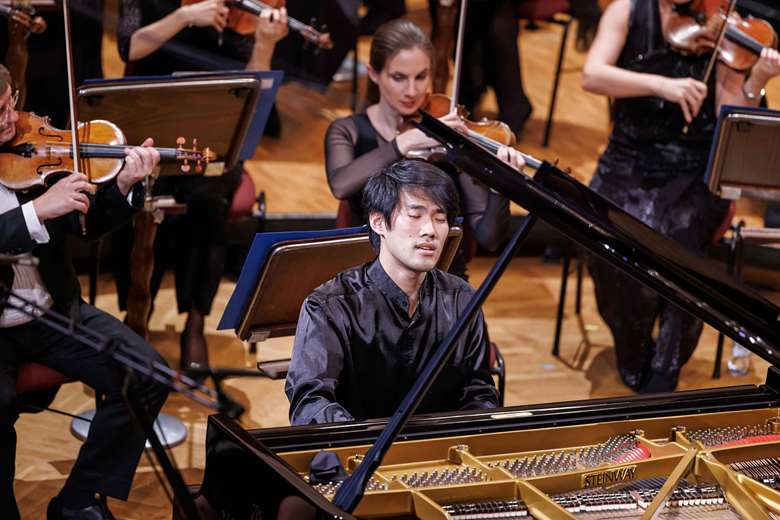Chopin in Context: introducing the 20th Chopin And His Europe festival
SponsoredWednesday, August 21, 2024
The 20th Chopin And His Europe festival will underline the composer’s place at the heart of the continent’s musical identity

With a heavy heart, the 20-year-old Fryderyk Chopin left Warsaw in 1830, never to return. Even as he started to co-create the sound of 19th-century Europe from Vienna and later Paris, the influence of his native Poland grew stronger than ever inside Chopin. He never stopped loving the country even as he suffered its misfortunes by proxy in exile. Polish rhythms, harmonies, styles and melodic traits would suffuse the composer’s music and stoke in it the heroism and spirit of his native land. Would that ever have happened had he stayed put?
For two decades, the Chopin And His Europe festival has sought to put the composer’s music in a wider context – to recognise the artist’s significance to Poland and its music life, but also to remind us how vital a force Chopin was to the development of music in a burgeoning Europe. As Romanticism blossomed at the heart of the continent, a cohort of musicians emerged whose works were inspired by distinct national idioms. In that regard, Chopin blazed a trail.
While the likes of Grieg and Bartók could be credited for changing stylistic attitudes to music, Chopin could add to that the transformation of one instrument’s entire language and grammar. Naturally, the piano sits at the heart of the Chopin And His Europe Festival, which has enjoyed a special relationship with pianists including Martha Argerich, Nelson Freire and Ivo Pogorelich. Many pianists have had their perceptions of the composer changed by the festival’s focus on both modern and period instruments. It was at this festival that Martha Argerich performed for the first time on a period piano in public.

This has always been an event at which artists meet audiences and each other – but also meet unique pianos from the Fryderyk Chopin Institute’s collection of historic instruments which includes Érards, Broadwoods and, of course, Chopin’s favoured Pleyels. These straight-strung pianos, with their more piquant and nuanced sound, reveal countless treasures in Chopin’s music – throwing fresh light on his unmatched decorative writing, his striking harmonic invention and his focused understanding of the mechanisms of the instruments he played.
The continual reappraisal and rediscovery of Chopin’s music depends on engagement with performance practice – a theme that runs through this 20th edition of the Chopin And His Europe Festival, under the vision of its artistic director, Stanisław Leszczyński. This year’s specially extended 20th festival will also include a performance of Stanisław Moniuszko’s opera The Haunted Manor (‘Straszny dwór’) in which Fabio Biondi will conduct his period-instrument ensemble Europa Galante, a group of Polish and foreign soloists and the Podlasie Opera Choir from Białystok. The performance presents another vital opportunity to hear a major score by the father of Polish opera, whose work bears such a fascinating connection to Chopin’s own.
That is just one highlight of the 2024 event, which will entertain and enrich Chopin’s home city of Warsaw from August 17 to September 8. More than 40 performances will incorporate piano and vocal recitals, symphonic and chamber concerts. An astonishing roster of world-class pianists will come to the Polish capital to participate, including Ingrid Fliter, Garrick Ohlsson, Dang Thai Son, Kevin Kenner, Bruce Liu, Yulianna Avdeeva, Hélène Grimaud, Ewa Pobłocka, Cyprien Katsaris, Nelson Goerner and Marc-André Hamelin. As usual, the festival will also offer performance opportunities to the best emerging talents including laureates of the Chopin International Piano Competition.

In parallel with these pianists, the festival has assembled its biggest ever roster of distinguished domestic and visiting ensembles, including the London Symphony Orchestra, Warsaw Philharmonic, {oh!} Orkiestra, Aukso Orchestra, KBS Symphony Orchestra, Sinfonia Varsovia, Collegium Vocale Ghent, Collegium 1704, Kammerorchester Basel, Orchestre des Champs- Elysées, Belcea Quartet, Mosaiques Quartet and Appolon Musagète Quartet. Music will be played by rarely heard Polish composers whose work helps contextualise Chopin’s, including Moritz Moszkowski, Juliusz Zarębski, Antoni Stolpe and Feliks Janiewicz.
In a Warsaw looking at its radiant best in August, there will also be the chance to hear the first ever period-instrument performance of Smetana’s Má vlast from Collegium 1704 under Václav Luks; European polyphony from Collegium Vocale Ghent conducted by Philippe Herreweghe; Ewa Pobłocka’s traversal of Bach’s Well-Tempered Clavier and two performances from the London Symphony Orchestra under its new Chief Conductor Sir Antonio Pappano, who will play Sibelius, Elgar and Holst in addition to Chopin’s Piano Concerto No 1 with soloist Bruce Liu. Recitals from Eric Guo, Dmitry Ablogin, Alberto Nosé, Ingrid Fliter, Bartosz Skłodowski and Kevin Kenner (on period pianos) will get to the heart of Chopin at his most intimate and introspective.
Two centuries on from the composer’s short life in Europe, Chopin’s music still has the capacity to stun worldwide audiences into silence while peering deep inside the human condition. Chopin was never working in a vacuum, culturally nor musically, and his work is only enhanced by hearing it the context of his peers – wherever they were from. After all, Chopin may be Polish through and through, but he belongs to all of us.
The 20th Chopin And His Europe festival runs from 17 August to 8 September 2024: festiwal.nifc.pl/en/







